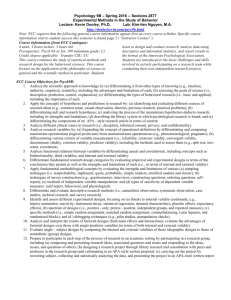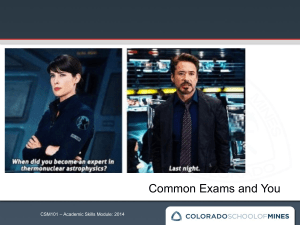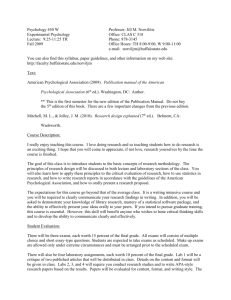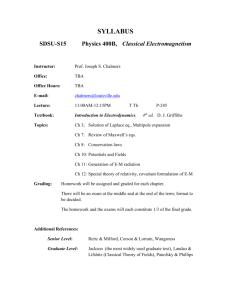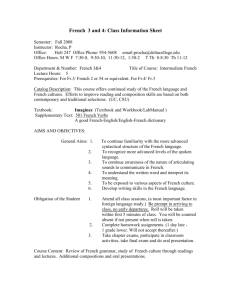Psych 9B Course Syllabus
advertisement
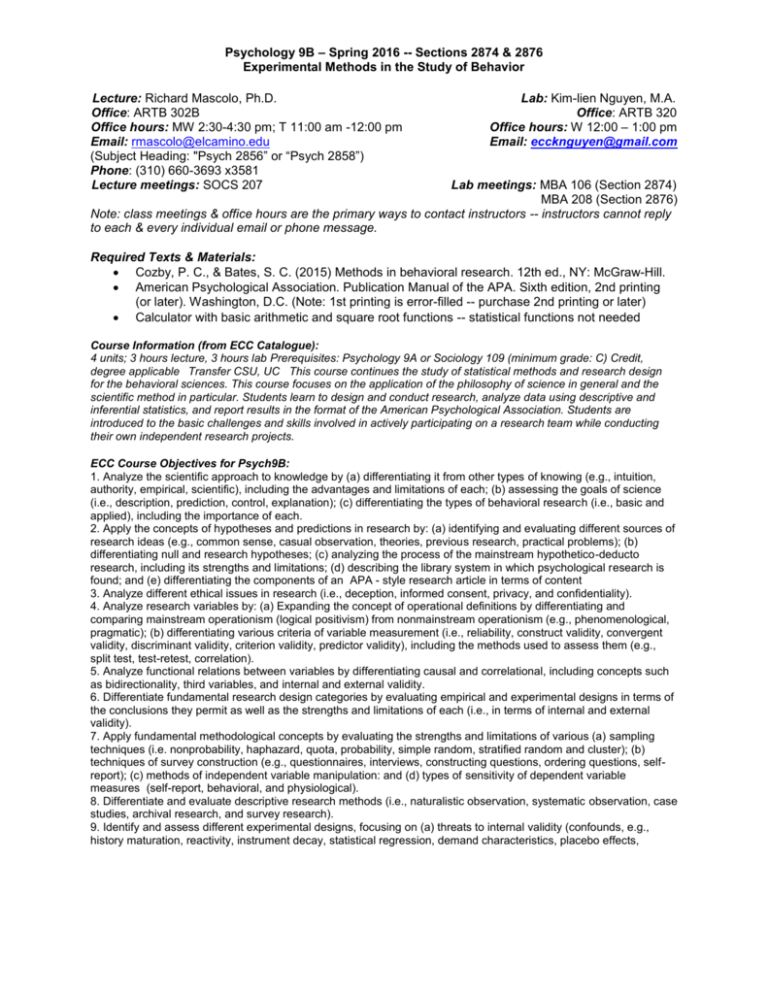
Psychology 9B – Spring 2016 -- Sections 2874 & 2876 Experimental Methods in the Study of Behavior Lecture: Richard Mascolo, Ph.D. Office: ARTB 302B Office hours: MW 2:30-4:30 pm; T 11:00 am -12:00 pm Email: rmascolo@elcamino.edu (Subject Heading: "Psych 2856” or “Psych 2858”) Phone: (310) 660-3693 x3581 Lecture meetings: SOCS 207 Lab: Kim-lien Nguyen, M.A. Office: ARTB 320 Office hours: W 12:00 – 1:00 pm Email: eccknguyen@gmail.com Lab meetings: MBA 106 (Section 2874) MBA 208 (Section 2876) Note: class meetings & office hours are the primary ways to contact instructors -- instructors cannot reply to each & every individual email or phone message. Required Texts & Materials: Cozby, P. C., & Bates, S. C. (2015) Methods in behavioral research. 12th ed., NY: McGraw-Hill. American Psychological Association. Publication Manual of the APA. Sixth edition, 2nd printing (or later). Washington, D.C. (Note: 1st printing is error-filled -- purchase 2nd printing or later) Calculator with basic arithmetic and square root functions -- statistical functions not needed Course Information (from ECC Catalogue): 4 units; 3 hours lecture, 3 hours lab Prerequisites: Psychology 9A or Sociology 109 (minimum grade: C) Credit, degree applicable Transfer CSU, UC This course continues the study of statistical methods and research design for the behavioral sciences. This course focuses on the application of the philosophy of science in general and the scientific method in particular. Students learn to design and conduct research, analyze data using descriptive and inferential statistics, and report results in the format of the American Psychological Association. Students are introduced to the basic challenges and skills involved in actively participating on a research team while conducting their own independent research projects. ECC Course Objectives for Psych9B: 1. Analyze the scientific approach to knowledge by (a) differentiating it from other types of knowing (e.g., intuition, authority, empirical, scientific), including the advantages and limitations of each; (b) assessing the goals of science (i.e., description, prediction, control, explanation); (c) differentiating the types of behavioral research (i.e., basic and applied), including the importance of each. 2. Apply the concepts of hypotheses and predictions in research by: (a) identifying and evaluating different sources of research ideas (e.g., common sense, casual observation, theories, previous research, practical problems); (b) differentiating null and research hypotheses; (c) analyzing the process of the mainstream hypothetico-deducto research, including its strengths and limitations; (d) describing the library system in which psychological research is found; and (e) differentiating the components of an APA - style research article in terms of content 3. Analyze different ethical issues in research (i.e., deception, informed consent, privacy, and confidentiality). 4. Analyze research variables by: (a) Expanding the concept of operational definitions by differentiating and comparing mainstream operationism (logical positivism) from nonmainstream operationism (e.g., phenomenological, pragmatic); (b) differentiating various criteria of variable measurement (i.e., reliability, construct validity, convergent validity, discriminant validity, criterion validity, predictor validity), including the methods used to assess them (e.g., split test, test-retest, correlation). 5. Analyze functional relations between variables by differentiating causal and correlational, including concepts such as bidirectionality, third variables, and internal and external validity. 6. Differentiate fundamental research design categories by evaluating empirical and experimental designs in terms of the conclusions they permit as well as the strengths and limitations of each (i.e., in terms of internal and external validity). 7. Apply fundamental methodological concepts by evaluating the strengths and limitations of various (a) sampling techniques (i.e. nonprobability, haphazard, quota, probability, simple random, stratified random and cluster); (b) techniques of survey construction (e.g., questionnaires, interviews, constructing questions, ordering questions, selfreport); (c) methods of independent variable manipulation: and (d) types of sensitivity of dependent variable measures (self-report, behavioral, and physiological). 8. Differentiate and evaluate descriptive research methods (i.e., naturalistic observation, systematic observation, case studies, archival research, and survey research). 9. Identify and assess different experimental designs, focusing on (a) threats to internal validity (confounds, e.g., history maturation, reactivity, instrument decay, statistical regression, demand characteristics, placebo effects, expectancy effects), (b) spectrum of designs (i.e., posttest - only, pretest - posttest, independent groups, and repeated measure); (c) specific methods (i.e., simple random assignment, matched random assignment, counterbalancing, Latin Squares, and randomized blocks); and (d ) debugging techniques (e.g., pilot studies, manipulation checks). 10. Analyze and interpret the results of factorial designs (both main effects and interactions); evaluate the advantages of factorial designs over those with single predictor variables (in terms of both internal and external validity). 11. Evaluate single - subject designs by comparing the internal and external validities of these idiographic designs to those of nomothetic (group) designs. 12. Prepare to participate in each step of the process of research in an academic setting by participating in a research group, including (a) composing and presenting research ideas, associated questions and issues and responding to the ideas, issues, and questions of others; (b) designing a research project through library research and consultation with peers and professor in the research group (and culminating in an APA-style written proposal: (c) carrying out the project by recruiting subject, collecting and statistically analyzing the data, and presenting the project in an APA-style written report. Student Learning Outcomes (SLOs): SLO #1 Logic of the Scientific Method Students who finish this course with a grade of A, B, or C will be able to explain and critique essential components of the scientific method in psychological research. Students will be assessed by multiple choice exams, essay exams, or oral presentations. SLO #2 Fundamental Principles Students who finish this course with a grade of A, B, or C will be able to explain and apply essential elements of the scientific method in psychological research. Students will be assessed by: a) APA formatted paper presenting the rationale and results of an individual research project and b) multiple choice exams, essay exams, or oral presentations. SLO #3 Everyday Application Students who finish this course with a grade of A, B, or C will be able to evaluate both the adequacy and relevance of research in their efforts to understand everyday life experiences (e.g., choose a diet plan, decide if a treatment or product is safe and effective, vote for or against a proposition). Students will be assessed by multiple choice exams, essay exams, oral presentations, or research-based papers. ADA Statement: El Camino College is committed to providing educational accommodations for students with disabilities upon the timely request by the student to the instructor. A student with a disability, who would like to request an academic accommodation, is responsible for identifying herself/himself to the instructor & to the Special Resource Center. To make arrangements for academic accommodations, contact the Special Resource Center (SRC). The mission of the SRC is to facilitate academic success for verified students with disabilities by providing equal access to educational opportunities in an integrated campus setting. The SRC provides support services, adaptive equipment, computer technology, & specialized instruction designed to meet the educational needs of students with disabilities. In order to be eligible for support services or accommodations, a student must provide documentation of his/her disability or be assessed by SRC professional staff. Eligibility is determined by specially trained & highly skilled professional staff members. Specific educational needs are identified on an individual basis, & a plan is developed with each student. Examples of services or accommodations include but are not limited to: American Sign Language interpreters, testing accommodations, access technologies, or printed materials made available in alternate formats. Students with verifiable disabilities who do not wish to avail themselves of the services of the SRC may still be eligible for reasonable accommodation(s) & service(s) by contacting the Dean of Enrollment Services at 310-660-3482 located in the Student Services Center, Room 200. El Camino College recognizes its responsibility to provide an equal opportunity for education for all students. It is the policy (Board Policy 1600) of the El Camino Community College District to encourage full inclusion in all programs & services. Accommodations & alternate formats are available upon request. Please visit us in person -- east side of the Student Services Center, on the web -- www.elcamino.edu/academics/src , or on the phone -- 310-660-3295 or 424-236-6264 (VP). Grading Basis: Lecture Score: 3 Exams weighted equally Lab Score: 2 APA-style research papers (80%); lab assignments (15%); oral presentation (5%) Lecture & Lab Scores are combined with this formula to determine Course Percentage: CP = (Lecture Grade x 75%) + (Lab Grade x 25%) Course Percentages determine Final Grades according to this scale: Course Percentage Final Grade 90 --100 A 80 -- 89 B 70 -- 79 C 65 -- 69 D 0 -- 64 F Professor Policies: I expressly prohibit any form of copying, recording, photographing, downloading, sharing, or obtaining the contents of my Lecture presentations or Exams. I expressly prohibit students from submitting works (e.g., homework assignments, APA papers) written for previous semesters -- they are considered plagiarized and will receive 0 points (see “Self Plagiarism”--Section 6.02 of the APA Publication Manual). This prohibition refers specifically to the ECC Board of Trustees Administrative Procedure 5500 -- Standards of Student Conduct. A hyperlink is provided below; here is an excerpt of relevant portions: Definitions: The following misconduct shall constitute good cause for discipline including, but not limited to, the removal, suspension, or expulsion of a student. DISHONESTY 1. 2. 3. 4. 5. 6. 7. 8. Cheating, plagiarism (including plagiarism in a student publication), or engaging in other academic dishonesty as defined in the College catalog. Representing the words, ideas, or work of another as one’s own in any academic exercise including the use of commercial term paper companies or online sources for essays, term papers, or research papers, whether free or paid. Copying from another student or former student or allowing another student to copy from one’s work. Allowing another individual to assume one’s identity or assuming the identity of another individual. Unauthorized collaboration-intentionally sharing or working together on an academic exercise when such actions are not approved by the course instructor. Changing answers on a previously scored test, assignment, or experiment with the intent to defraud. 1. Inventing data for the purpose of completing an assignment, a laboratory experiment, or case study analysis with the intent to defraud. 2. Obtaining or copying exams, test questions, or other course materials when prohibited by the instructor. 3. Giving or receiving information during an examination or test by any means such as sign language, hand signals or secret codes, or through the use of any electronic device. 4. Using aids such as notes, calculators, or electronic devices unless specifically authorized by the instructor or District personnel. 5. Handing in the same paper or other assignment in more than one class when prohibited by the instructor. 6. Any other action which is not an honest reflection of a student’s own academic work. Dishonesty, forgery, alteration, or misuse of District documents, records or identification, or knowingly furnishing false information to the District. Unauthorized preparation, giving, selling, transfer, distribution, or publication, for any commercial purpose, of any contemporaneous recording of an academic presentation in a classroom or equivalent site of instruction including, but not limited to, handwritten or typed class notes, still photos, audio, or video recording, except as permitted by any District policy or administrative procedure. I have emphasized these specific sections of ECC Board Policy 5500 above, but all sections of the policy are enforced in this course: http://www.elcamino.edu/administration/board/boarddocs/AP%205500%20Standards%20of%20Studen t%20Conduct.pdf Students who do not participate (e.g., miss Exams or Lab Assignments) or who are disruptive (see ECC Policies below) may be dropped from the class by the professor. Students are responsible for keeping abreast of course announcements, including any changes in the Reading/Lecture or Dates specified in the Course Schedule below. Study guides are not provided in this class; instead, students are expected to attend lectures in an active, purposeful way – i.e., taking extensive notes that will comprise their own study guide. Course grades are determined solely by the requirements detailed in Grading Basis above. Extra credit is offered on exams but is not invented at the end of the semester to make up for failing scores throughout the semester. Students should each have a textbook & an APA Publication Manual & bring them to every class meeting -- both lecture & lab. Students should independently confirm these important dates: Friday, January 29, 2016 is the last day to: 1) add full semester courses, 2) challenge residency status for current semester 3) drop for an enrollment fee refund (full semester classes); 3) drop without notation on permanent record. Friday, April 15, 2016 is the last day to drop with a “W”. Succeeding in this Course: Do the math: The California Community Colleges Guidelines for Title 5 Regulations, Chapter 6, Part 1 sets standards for the amount of work (measured in hours) per unit of college credit: For each hour of lecture, it is assumed that students will be required to spend an additional two hours of study outside of class. This course is 4 units – Lab Courses add 1 Lab Hour (I know, it’s actually 3 Hours) to 3 Lecture Hours. The upshot is that the CCC Guidelines require this course to require about 6 hours of student work per week. How should this time be spent? Reading and Studying the assigned textbook material & my lecture notes. Notice I say Reading AND Studying. It is not enough simply to read the material—or even to read and reread the material. That is, passively taking in the authors’ words will not make the material available to you during an exam—or later in life. If you are experienced in succeeding in college courses, you know that you must work actively with the material you are required to learn. Maybe you’ve heard of the SQ3R (now the SQ4R to some), which is one system of study that promotes this approach of “active studying.” The essential feature boils down to working with the material in an active way so that you not only remember it, but you can think critically about it, e.g., questioning assumptions & conclusions, considering alternative explanations, applying principles to your life. O.K., look at this issue more pragmatically (and immediately)—actively studying the course material is the best way to pass exams! Again, it is not enough simply to read and reread the materials. As you are reading, you should be thinking about how you might be tested on the material during the upcoming exam—and whether or not you would be able to answer exam items. Read a few paragraphs and then stop—cover the material and ask yourself questions like, “What did I just read—how would I summarize this for another student in the course?” and “What kind of exam item would test this material—would I be able to answer that item?” Lastly, I want to emphasize that you are responsible for your success in this course. If you are a student who simply must have an A in this course, then your magic number is 90% – the minimum percentage needed for an A. If you’re satisfied just passing with a C, then the percentage you have to hit is 70%. My point is that you earn your grade – I don’t give it to you. Remember, there is no last-minute, end of the semester extra credit assignment that I will invent to save those who have only then realized they have not been scoring the points they need for the grade they want. Lecture Schedule: Week Chapter Reading Lecture 1 1/18 1 Scientific Understanding of Behavior Philosophy of Science 2 1/25 2 Where to Start Hypothetico-Deducto System 3 2/1 3 Ethics in Behav'l Research Ethics & Fraud 4 2/8 4 Fundamental Issues Reliability vs. Validity 5 2/15 5 Measurement Concepts Operational Definitions 6 2/22 6 Observational Methods Quantitative vs. Qualitative Data 7 2/29 3/1 Exam #1 Monday, February 29 7 Survey Research ----Determining Validity in Surveys 8 3/8 8 Experimental Design Causal Inference Spring Break 3/14 ----- ----- 9 3/21 9 Conducting Experiments Methodology 10 3/28 10 Complex Experimental Designs Dismantling & Factorial Studies 11 4/4 11 Single-Case, Quasi-Experimental, & Developmental Research Nomothetic vs. Idiographic Research 12 4/11 12 Understanding Research Results: Description & Correlation Biased & Unbiased Statistics 4/18 Exam #2 Monday, April 28 ----- 4/20 13 Understand Results: Statistical Inference 14 4/25 ------ Null Hypothesis Testing (NHST) Null Hypothesis Testing (NHST) continued 15 5/2 ------ Statistics Reform 16 5/9 5/11 -----Exam #3 Wednesday, May 11 Statistics Reform continued ----- 13 Lab Due Dates: Paper Assignment Research Proposal Final Paper Section 2874 Friday March 4 Friday April 29 2876 Wednesday March 2 Wednesday April 27 ECC Policies Students who enroll in class but do not attend the first scheduled class meeting may be dropped from the roster & their places given to waiting students who were unable to enroll at the time of registration. If illness or emergency prevents a student from attending the first class session, the student must contact the instructor. A student who registers for a class & never attends is still responsible for dropping the class. Failure to properly drop a class may result in a “W” & may subject the student for any & all fees associated with the class. Students will not be permitted to attend classes in which they are not enrolled. Exceptions may be allowed by the instructor for bonafide visitors. Students who attend a class without proper enrollment (the student did not properly register or add the class) by the published deadline will not be permitted to “late add” the class except for documented extenuating & mitigating circumstances. Students are expected to attend their classes regularly. Students who miss the first class meeting or who are not in regular attendance during the add period for the class may be dropped by the instructor. Students whose absences from a class exceed 10% of the scheduled class meeting time may be dropped by the instructor. However, students are responsible for dropping a class within the deadlines published in the class schedule. Students who stop attending but do not drop may still be retained on the course roster & receive a failing grade. Students may view their registration status on MyECC. If space is available, students who have completed registration may add a class by going to the first meeting of the class & securing permission of the instructor. It is the responsibility of the student to fulfill all requirements to add a course, & to add the course by the add deadline in accordance with college procedures. Adds will not be processed beyond the add deadline. Official withdrawal from class must be processed through the online system in the Admissions Office. Failure to complete this process may result in the assignment of a letter grade of A through F. It is the responsibility of the student to officially drop a class by the deadline date. Student Rights & Grievances Procedure 5530 http://www.elcamino.edu/administration/board/policies.asp
